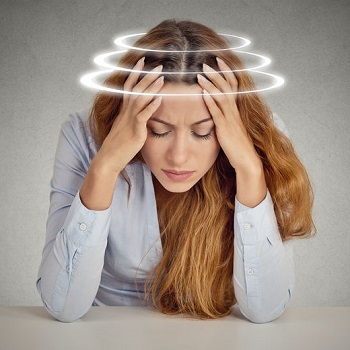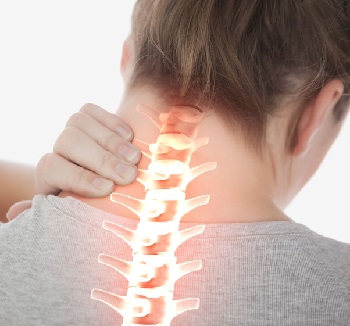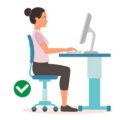5 Habits to Prevent Neck Related Dizziness
Poor neck posture can lead to the type of disorders that can lead to dizziness. Women working at home in makeshift offices are particularly vulnerable. Changing some screen time habits can prevent neck-related dizziness.
Neck movement and spinal health affect your balance, movement, and coordination, and, for some people, neck problems might present as dizziness or vertigo. Physical therapies like massage, manipulation, and heat treatment can often improve movement and decrease symptoms, but the dizziness could also indicate a more serious illness needing medical attention.
Dizziness is something many people experience, for various reasons and at any age. It is often described as lightheadedness, feeling faint or a feeling not quite right with, or a spinning sensation. For some people, it can also be additionally uncomfortable with a loss of balance, feelings of nausea and at worst vomiting.
Dizziness related to Neck Position
Poor neck posture can lead to the type of disorders that can cause dizziness. By habitually leaning into or down to a screen you can strain neck muscles and add unwanted pressure to the spine. When looking down, head forward of your shoulders, the upper vertebrae can become hyper-extended and the spine misaligned as weight is shifted. Headaches, numbness in arms and hands, or dizziness can result. Exercise and health awareness, especially in relation to posture, are important longer-term factors to keep your neck and spine healthy.
Serious Health Stuff for Women working at Home
More serious diseases linked to neck pain, and the resulting dizziness/balance problems, include age-related osteoarthritis or rheumatoid arthritis, tumors, degenerative or herniated disc problems, and infections (like meningitis). These require medical diagnosis and treatment, and, in some cases, surgery.
The part of the brain affecting balance is the cerebellum. It controls balance, movement, and coordination. To maintain balance, the body also relies on three sensory subsystems, the vestibular (inner ear), visual (eyes and eyesight), and proprioceptive (nerves, ligaments, muscles) systems. Anything that damages your neck or affects neck movement has the potential to affect or disrupt all these and induce dizziness.
Cervical vertigo is a spinning sensation induced or aggravated by neck movement concerning bones, discs and joints. This is often accompanied by dizziness and is due to a disruption of blood flow to the inner ear or to the brain stem, part of the vestibular system. It is a symptom of several causes, some degenerative, some trauma-based. Poor head posture, neck disorders, or injury affecting the head and spine are common causes of the dizziness. For car accident victims who suffer a whiplash, which results in a misalignment of the head and neck, cervical vertigo may be temporary or require ongoing treatment.
Neck problems are happening to Younger Women
Some neck arthritis, or cervical osteoarthritis, is expected as we age. The worrying trend is that neck arthritis is occurring in younger people and there is an increasing correlation with increased desk and screen time. In some advanced cases of cervical osteoarthritis, bone spurs can impose on and narrow the spinal canal and neck. Pressure placed on nerves here can induce dizziness and scramble messages to the proprioceptive system. Age, genetics, and weight are factors influencing both the development and seriousness of any symptoms.
A slipped (herniated) disk, which is a problem with the alignment of cushioning between vertebrae, can do the same thing and be a potential cause of neck-related dizziness. These are usually the result of trauma, but non-traumatic disc herniations are also occurring in younger people. While most cases involve the lower back (lumbar spine), it can occur in the neck (cervical spine).
Cervical spondylosis (advanced neck osteoarthritis) may be another condition causing your vertebrae and neck disks to wear and tear over time. This degeneration can cause pressure on the spinal cord or spinal nerves and block blood flow to the brain and inner ear. Recurrent overuse of neck and shoulder joints is a known cause of cervical spondylosis.
Being 25 years old, fit, healthy, and busy with family and business the last thing on your mind is protecting your body for the future. However, you don’t want to look back when you are 40 years old and running your billion-dollar empire and wish you had taken more care.
What does Ergonomic Research tell Us?
There have been a number of studies in the area of musculoskeletal disorders of the neck in office workers over the last 10-15 years. Home-based computer use is certainly a 21st-century issue. A systematic Cochrane review in 2018 concludes that there is no definitive evidence of the effectiveness of Ergonomic Interventions. There is no doubt that more quality studies are required. In the meantime, home-based businesswoman are reliant on the best experiential and common-sense advice available.
Basic Habits to reduce Neck Related Dizziness
1. Re-assess your Home Office Equipment
Sitting on the couch with your laptop is not an office. Nor is the kitchen bench while you are helping your children cook chocolate crackles. A desk or table with a height-appropriate stool, chair, or ergo ball is essential. Have you considered a sit-down-stand-up desk?
2. Practice good body posture
When we are completely obsessed with a project, there is a tendency to lean forward, raise our shoulders and our neck suffers . We know that we have to get out of the chair regularly, but 2 hours can disappear in a flash. And it’s not only your neck and shoulders that could be in trouble. Even your feet are vulnerable. Try to resume your default, neutral, body posture often. Perhaps every time you change to a different tab.
3. Get the right Glasses
Working on a computer screen is different from a book. The distance between your eyes and the reading surface is usually further away with a computer screen. Investing in a pair of glasses especially for computer work is money well spent. The reduction in neck movement and eye strain can be spectacular.
4. Relaxation and Massage
Fitting this into your crazy busy life is as important as breathing. There are lots of different approaches to stress and anxiety. Dizziness related to panic attacks is the last thing you need. Find your happiness, and create a special time and place to relax your mind and body.
5. Early Intervention
The longer that dizziness or other neck-related symptoms exist, the longer it takes for healing, rehabilitation, and restoration of full comfortable function. Act early.
There are many causes of dizziness and busy women tend to tolerate inconvenience and discomfort. If you are experiencing dizziness or worse we recommend that you seek accurate assessment, diagnosis, and treatment. Stop this silent epidemic by introducing 5 habits to prevent permanent damage to your neck and your body.





0 Comments